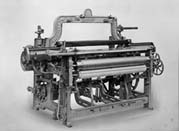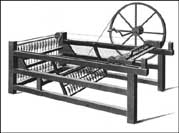|
Something else was happening
Cloth had been made in Britain for centuries, but the work had always
been done in small workshops or in people’s cottages. The spinning wheels
were pushed into a corner when the family wanted to eat.
A great change took place in the last quarter of the 18th century.
New inventions were changing the way in which cloth was made. When Samuel
Greg began to build his mill in 1783, he built it to house spinning
frames. These spinning frames were large.
The workers needed plenty of light so the factory windows were large.
The machines needed power from a water wheel. Samuel Greg was using
new technology.
Young Robert Greg as always trying to persuade his father to use even
newer technology. The newest power looms for weaving could be powered
by water or steam. Samuel was not sure. It was a big risk. When he died
in 1834, he had still not agreed to change.
After his death, his son Robert lost no time. In 1836, alterations
were made to the building. Quarry Bank Mill soon had power looms, just
like Cartwright’s power loom. Now they could weave at Quarry Bank Mill
too.
 |
Flying Shuttle
The Flying Shuttle
make weaving faster than it had been before.
John Kay
|
|
 |
Spinning Mule
The spinning mule was
used to make high quality strong thread.
Samuel Cromptom
|
|
 |
Water Frame
The water Frame was
powered by water. It could only be used in factories. It
also made much stronger tread.
Richard Arkwright |
|
 |
Power Loom
This slowly took over
all weaving and it was powered by water or steam.
Edmund Cartwrigt
|
|
 |
Spinning Jenny
This machine could
spin eight yarns at once.
James Hargreaves |
|
These are a few videos of different machines working.
The Power Loom
High Quality
Medium Quality Movie
3 - power loom Movie 4 -
power loom
|